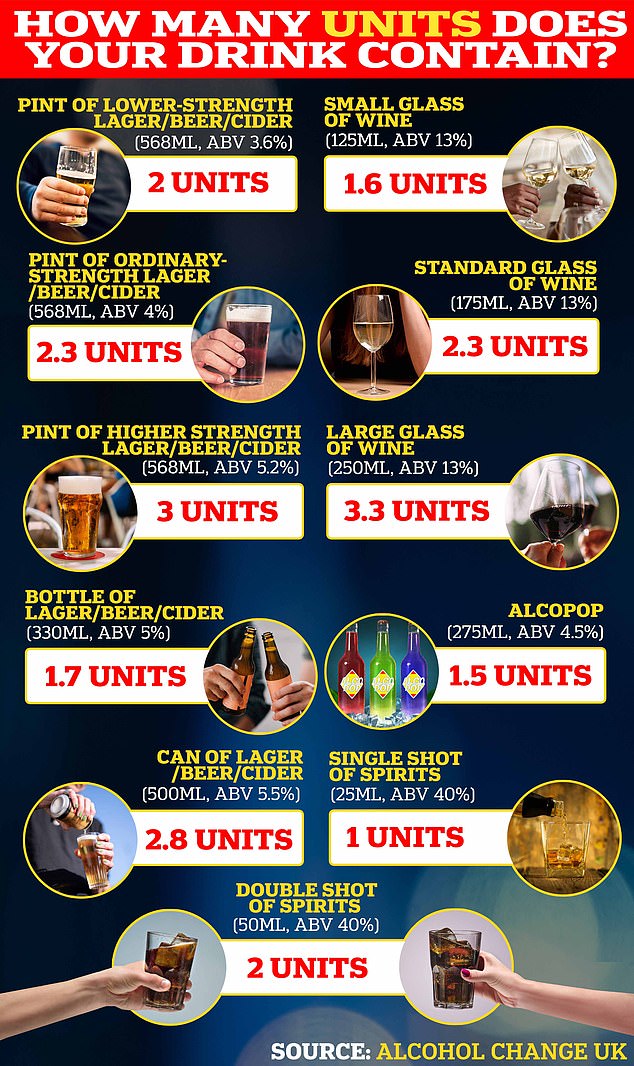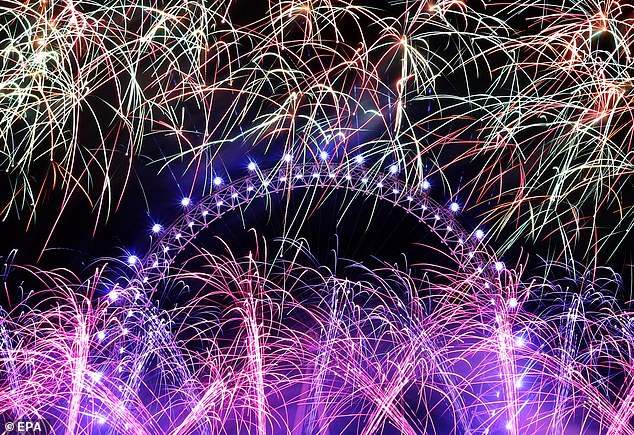Revealed: What to Drink Tonight to Avoid a Pesky Hangover Tomorrow – and the Drink That’s Worst for Morning Headaches
We all know that the severity of a hangover is largely related to the amount of booze we’ve swallowed down our throats.
But have you ever wondered why the morning after tasting a few Merlots and Malbecs you feel so much worse than, say, vodka?
Scientists think they have discovered the reason why certain drinks can cause so much pain the next day.
For those of us planning to ring in the new year with a drink, the theory is: the darker the drink, the worse the hangover.
“Different drinks contain different amounts of substances called ‘congeners’,” says Dr Sally Adams, who researches the effects of alcohol at the University of Birmingham.
‘These are added during the fermentation process to improve the taste, aroma and color of a drink.
‘A small amount of evidence suggests that drinks with higher levels of congeners (e.g. dark spirits and red wine) may lead to greater hangover severity compared to drinks with lower congeners (e.g. gin, vodka).’
Studies have also suggested that vodka and beer contain the least.
Have you ever wondered why you feel so much worse in the morning after tasting a few Merlots and Malbecs, compared to, say, vodka?
A 2009 article published in the journal Nature found that bourbon contains 37 times more congeners than vodka.
Another 2010 study found that bourbon can cause worse hangovers than vodka.
The researchers from Brown University in Massachusetts asked participants to drink caffeine-free cola, vodka or bourbon and later asked them questions about their hangover.
Those who drank the bourbon had more severe symptoms than those who drank the vodka.
But another, far more recent studyhas also discovered the reason why red wine is likely to give you a nasty hangover.
According to American scientists, a substance called quercetin – which is abundant in red wines – can prevent the body from processing alcohol properly.
Red wine contains more quercetin because whole grapes, including the skins, are used; white wine has the skin and seeds removed.
Quercetin is also more abundant in grapes exposed to more sunlight, according to researchers at the University of California.

The NHS recommends people drink no more than 14 ‘units’ of alcohol – around six glasses of wine or pints of beer – per week
This means that cheaper red wine may actually be better for preventing a hangover, because cheaper grape varieties are grown on vines with a large canopy and lots of leaves, so they don’t get as much sun.
“If you’re willing to take a chance, look for a cheap, lighter red wine,” said Professor Andrew Waterhouse, an expert in oenology, and Apramita Devi, a postdoctoral researcher in food science. The conversation.
The scientists don’t know exactly how quercetin affects people directly, but they think it blocks an enzyme necessary to break down alcohol in the body.
“First, alcohol is converted (in the liver) into the compound acetaldehyde,” they said.
‘The enzyme ALDH then converts the acetaldehyde into acetate, a common and harmless substance.’
Once this happens, it can be removed from the body as waste.
However, quercetin prevents acetaldehyde from converting to acetate, so it stays in the body and causes inflammation and headaches.
“Our enzyme tests suggest that quercetin… interferes with alcohol metabolism in your body,” she added.

For those of us planning to ring in the new year with a drink, the theory is: the darker the drink, the worse the hangover
Studies have previously suggested that histamine – an ingredient more common in red wine than white or rosé – may be responsible for red wine headaches, which can strike within half an hour of drinking even small amounts.
Histamine can dilate the blood vessels in the body, which can cause headaches. But the research is limited.
Beer has an average lower alcohol content than wine, 4.4 percent and 13 percent respectively. The spirits are even higher, at 40 percent.
Processing one unit of alcohol – roughly one shot or half a pint of lower strength beer – takes the average adult about an hour, the NHS says.
The health service recommends people drink no more than fourteen ‘units’ of alcohol – around six glasses of wine or pints of beer – per week.
Meanwhile, the US says women should have no more than seven standard drinks a week, while men should have 14.
Scientists across the board agree that excessive alcohol consumption can permanently damage the liver, cause a range of cancers and increase blood pressure.
It strains the heart muscle and can lead to cardiovascular disease (CVD), increasing the risk of heart attack and stroke.
Binge drinking – sometimes defined as consuming five drinks in two hours – can cause the heart to beat irregularly, which can cause symptoms such as shortness of breath, fatigue and increased blood pressure.
The World Health Organization estimates that alcohol kills three million people around the world every year.
